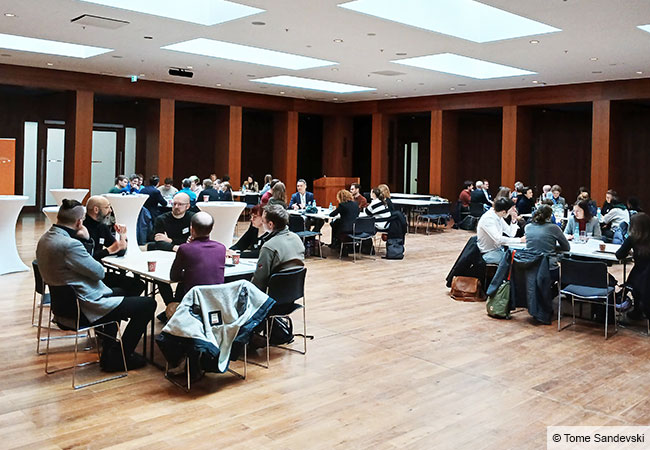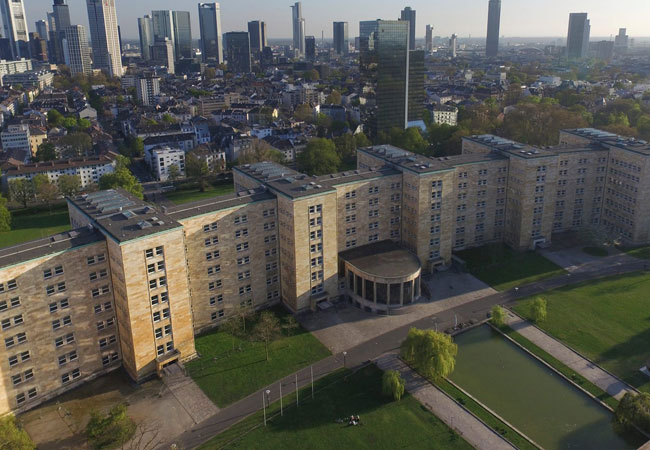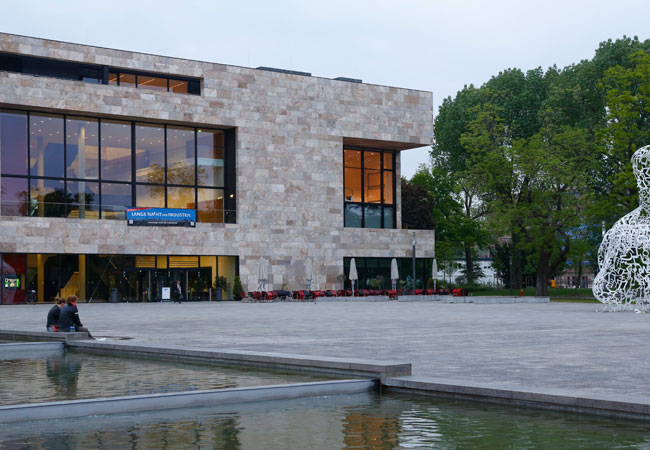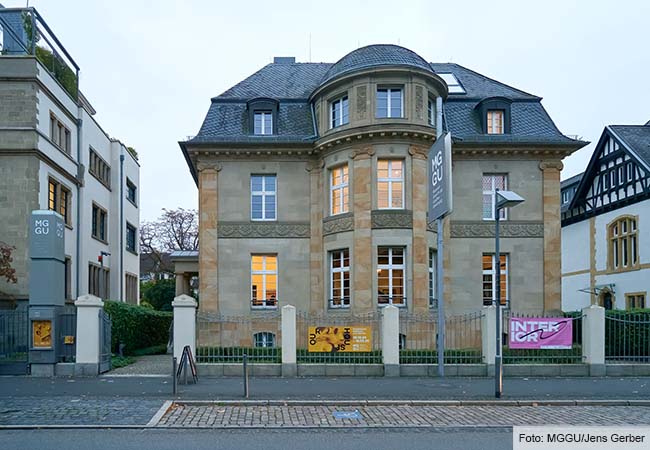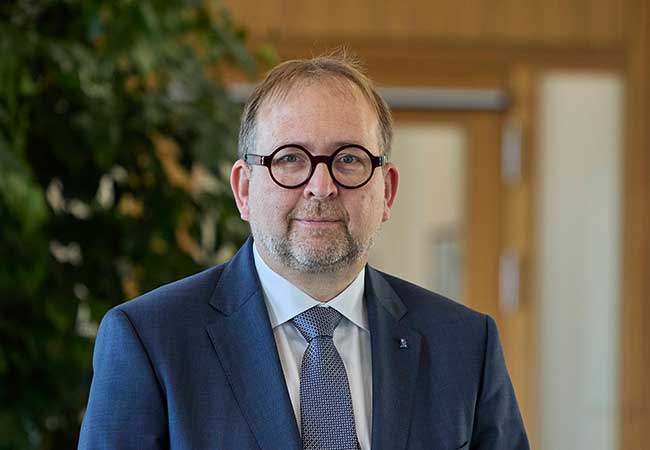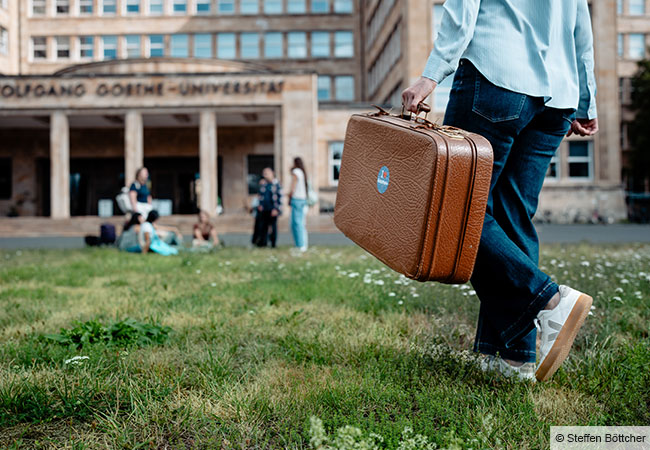Award recognizes work in the field of environmental and socio-ecological sustainability research at Goethe University Frankfurt.
This year’s „Frankfurter Preis für Umwelt und Nachhaltigkeit 2023” [Frankfurt Prize for Environment and Sustainability] was awarded to four of Goethe University Frankfurt’s Early Career Researchers. The main prize, endowed with €3,000, went to Florian Ungeheuer for his dissertation in chemistry. The three sponsorship awards, of €1,000 each, went to Johannes Degen (environmental sciences), Nina Kuschik-Maczollek (aquatic ecotoxicology), and Sophie Ruth Redeker (physical geography).
Both the main and sponsorship prizes, awarded by the Goethe Research Academy for Early Career Researchers’ (GRADE) Sustain Center, recognize qualification work in the field of environmental and socio-ecological sustainability research. The award ceremony took place on July 14, 2023, during an academic celebration at Goethe University’s Geosciences and Geography Faculty.
Main Award (€3,000)
Florian Ungeheuer (Dissertation: Chemistry)
Chemical characterization and source attribution of aviation-related ultrafine particles
Faculty of Biochemistry, Chemistry and Pharmacy
Reviewers: Prof. Dr. Alexander Vogel, Prof. Dr. Martin Schmidt
In his dissertation, Florian Ungeheuer chemically characterizes ultrafine particles (UFPs) in Frankfurt Airport’s exhaust plume. UFPs are particles whose diameter is smaller than 100 nanometers, large numbers of which are found near airports. The work set out to gain insights into their sources and formation mechanisms. Using state-of-the-art analytical methods, Ungeheuer determined the molecular fingerprints of synthetic engine lubricating oils. He was able to detect this fingerprint in the smallest particles examined in the ambient air in Frankfurt’s Schwanheim district. The quantification of individual lubricating oil esters has improved our understanding of new particle formation in aircraft turbines’ cooling exhaust gas. Based on the knowledge gained, effective mitigation measures can now be derived. We now know that lubricating oil emissions are an important factor in UFP formation, and that simply switching to non-fossil kerosene will not resolve this issue at airports.
Sponsorship awards (€1,000 each)
Johannes Degen (Master thesis: Environmental Sciences)
Interhemispheric gradients of long-lasting greenhouse gases in the upper troposphere
Faculty of Geosciences and Geography
Reviewers: Dr. Tanja Schuck, Prof. Dr. Andreas Engel
Johannes Degen’s master thesis addresses the topic of „Interhemispheric gradients of long-lived greenhouse gases in the upper troposphere“, specifically so-called F-gases, which are purely anthropogenic substances containing fluorine, and which are used, among others, as surge protectors, in semiconductor technology, as refrigerants or to impregnate outdoor clothing. Although they occur in the atmosphere only in small quantities, many F-gases are very potent greenhouse gases and contribute to the manmade greenhouse effect. Unfortunately, they find little resonance in the public discussion. Using the example of SF6, the strongest known greenhouse gas, Degen studied the exchange of air mass between the Earth’s northern and southern hemispheres. Specifically, he compared the gas’ spatial distribution in the tropopause region at an altitude of 10-12km with that observable on the ground. Some of his observations differ significantly from a simple model of the atmosphere. In his work, Degen raised his own questions and developed new approaches in a manner that far exceeds the level expected for a master’s thesis.
Nina Kuschik-Maczollek (Master thesis: Aquatic Ecotoxicology)
Ecotoxicological evaluation of a floodplain restoration project near an industrial plant
Faculty of Biological Sciences
Reviewers: Prof. Dr. Jörg Oehlmann, Prof. Dr. Henner Hollert
The Lower Main River’s most extensive floodplain restoration project is being carried out at the Fechenheimer Main River bend, in an area that experiences regular floods. Due to the historical discharge of wastewater from a former aniline dye factory into the Main River, high pollutant loads can be assumed, which may jeopardize the renaturation’s success. In her master’s thesis, Kuschik-Maczollek analyzed water samples, suspended matter, sediments and soils for toxicity, including mutagenic, hormone and dioxin-like effects. The samples were also analyzed for several hundred contaminants. In the process, she identified particularly highly polluted hot spots in the Main River bend. Kuschik-Maczollek not only recorded the pollution in an exemplary manner, she also integrated all relevant stakeholders into her project at an early stage, thus ensuring that the findings could be taken into account in the renaturation measures’ further planning and implementation.
Sofia Ruth Redeker (Master thesis: Physical Geography)
Impact of climate change on agriculture in Saxony-Anhalt. Model-based analysis of changes in irrigation water demand for winter wheat in the district of Mansfeld-Südharz.
Faculty of Geosciences and Geography
Reviewers: Dr. Robert Lütkemeier, Prof. Dr. Petra Döll
Irrigation in agriculture still accounts for less than 5% of total water withdrawals in Germany. However, due to rising temperatures and decreasing summer precipitation, the need for irrigation is expected to increase in the future, intensifying competition for the scarce resource water. In her excellent master’s thesis in physical geography, Redecker investigates the impact of four scenarios of future climate change on winter wheat yields in one of Germany’s largest areas of cultivation in Saxony-Anhalt. Using a complex numerical agroecosystem model, she compared the yields that could in future be achieved both with and without irrigation. One surprising study result is that amid declining precipitation and even without irrigation, no yield reduction is calculated; this is due to the fertilization effect of rising CO2 concentrations in the atmosphere.


